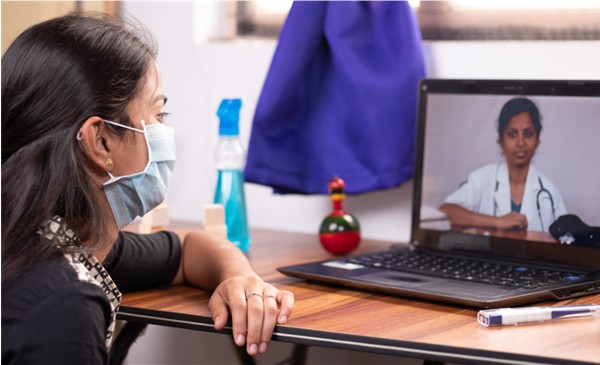
Concept: "Telehealth" / Girl in medical mask listening to doctor on laptop at home during COVID-19 pandemic
FRANKFORT, KY — Despite COVID-19, researchers from the University of Kentucky have continued their work on studying opioid use disorder.
Those researchers shared an update earlier this month on their projects and advocated for permanently expanding some telehealth services during a presentation to the Substance Use Recovery Task Force.
According to Sharon Walsh, director for the Center on Drug and Alcohol Research at the University of Kentucky, the expansion of telehealth services across the Commonwealth during the COVID-19 pandemic is having a positive impact on those recovering from opioid use disorder.
“What we’re hearing from partners across the state who are providing care is that their no-show rate for appointments has dropped, in some instances, 30 percent,” Walsh said.
Gov. Andy Beshear expanded telehealth services in March to allow physicians to examine patients over the phone or via video conference to cut down on in-person interactions to slow the spread of COVID-19.
Walsh said prior to this executive order, opioid use disorder treatment was not permitted via telehealth.
“One of the things we’re hoping with our state partners is that once COVID is resolved and the demand for telehealth is not so critical as it is right now, that we’re able to keep some of those regulations rolled back as they are right now,” Walsh added.
As for the University of Kentucky’s research projects, Walsh and Lisa Cassis, vice president for research for the Department of Pharmacology and Nutritional Sciences, reported that the university’s research projects are going well.
Kentucky was one of four states in the country last year to receive National Institutes of Health funding to prevent and treat opioid use disorder in highly affected communities, according to their presentation.
The Helping to End Addiction Long-term, or HEAL Initiative kicked off in January and focuses on overdose education, naloxone distribution, delivery of medication for opioid use disorder maintenance treatment, and safer opioid prescribing methods and dispensing.
Other University of Kentucky-funded research projects underway include harm reduction initiatives to reduce the spread of HIV and Hepatitis C, according to the presentation.
There are 73 syringe services programs across the Commonwealth providing clean syringes to those with opioid use disorder. Reusing or sharing syringes can cause a variety of health problems, including HIV and Hepatitis C. According to Walsh, these programs also help connect people to treatment services. Research into prevention as treatment for Hepatitis C is also underway as well as programs to aid mothers with opioid use disorder.
END









